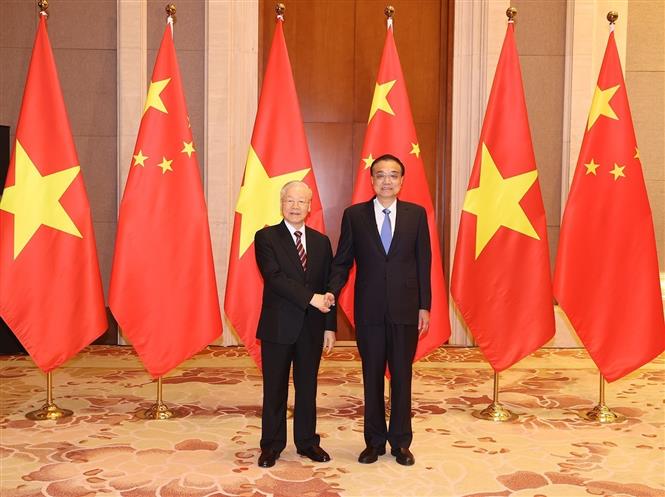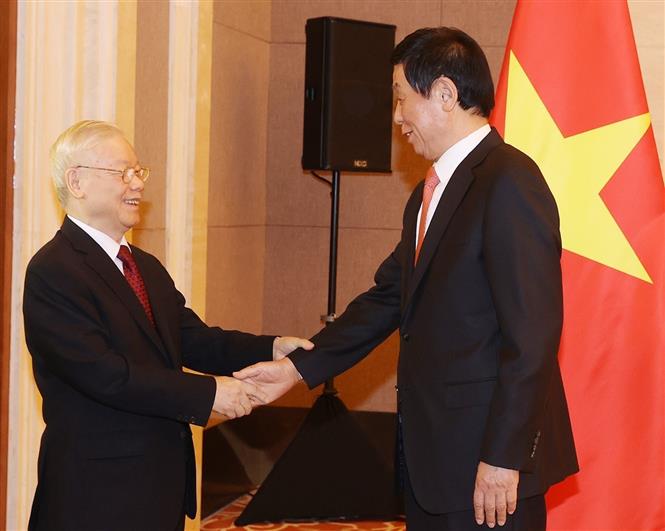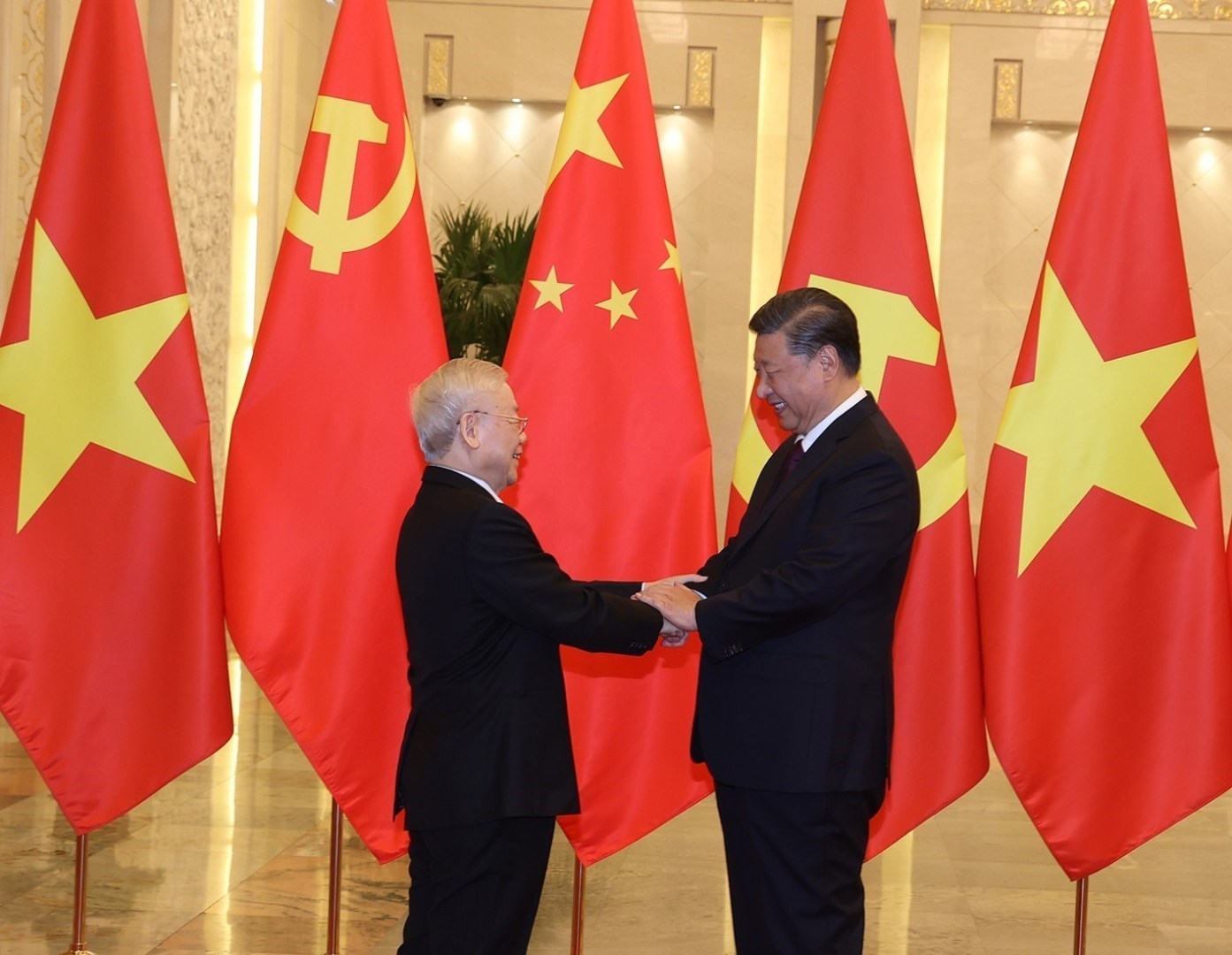
The official visit to China by Party General Secretary Nguyen Phu Trong at the invitation of Party General Secretary and President of China Xi Jinping has concluded successfully, positively contributing to strengthening the solidarity and traditional friendship between the two neighbouring countries; enhancing and deepening their comprehensive strategic cooperative partnership in the new era; and promoting peace, stability and prosperous development in the region and the world. Thirteen cooperation documents between the Communist Party of Vietnam (CPV) and the Communist Party of China (CPC), and between the two countries were signed during the 3-day visit.
In a thank-you message sent to Party General Secretary and President of China Xi, Party General Secretary Trong expressed his belief that the visit will contribute to defining long-term orientations for the relations between the two Parties, countries and peoples to grow further in a stable and sustainable manner.

Party General Secretary Nguyen Phu Trong: “Vietnam always attaches importance and gives the top priority to developing its comprehensive strategic cooperative partnership with China.”
At the end of the visit, the two sides issued a joint statement on continuing to enhance and deepen the Vietnam-China comprehensive strategic cooperative partnership.
While in China, the Vietnamese leader held talks with Party General Secretary and President of China Xi; received the Friendship Order of the People’s Republic of China presented by Xi on behalf of the Chinese Party and Government; met Premier Li Keqiang, Chairman of the Standing Committee of the National People’s Congress of China Li Zhanshu, and Chairman of the Chinese People’s Political Consultative Conference National Committee Wang Yang. At these talks and meetings, the two sides informed each other of the situation of their respective Parties and countries, exchanged opinions and reached many important common perceptions on the relationship between the two Parties and countries as well as the current international and regional situation.
Utilising cooperation mechanisms
The two sides consented to carry forward the role of the Steering Committee for Vietnam–China Bilateral Cooperation and the master plan, and intensify exchanges and cooperation in such fields as diplomacy, national defence and security, and law enforcement. They will also work to well implement the agreement on enhancing cooperation between the two Foreign Ministries in the new situation and maintain regular meetings between the two ministries’ leaders and exchanges between their departments.
Defence cooperation is one of the pillars of the bilateral relationship. The two countries will further increase high-level meetings between their armies; conduct exchanges and cooperation activities such as the Border Defence Friendship Exchange, the Defence Strategic Dialogue, joint patrols in the Gulf of Tonkin between naval forces, and a hotline between the two defence ministries; and deepen border guard cooperation, and promote joint land border patrols by border guards of the two countries.

The two sides agreed to continue consolidating and enhancing legal and judicial cooperation in order to create a legal basis to boost their comprehensive cooperation in all fields. They will work together to deepen collaboration in law enforcement at sea between their coast guards, properly handle emerging incidents at sea, and maintain security and stability at sea.
Bolstering economic, trade cooperation
Vietnam and China agreed to actively promote connectivity of their development strategies, accelerate discussion on and the signing of a cooperation plan between the two governments on promoting connectivity within the “Two corridors, one belt” Framework and the “Belt and Road” Initiative, roll out cooperation in production capacity, infrastructure construction and transport connectivity, and complete the evaluation of the Lao Cai-Hanoi-Hai Phong standard gauge railway planning at an early date.
The Vietnamese side is ready to create favourable conditions for businesses of the two countries to promote cooperation in investment, economy and trade. China encourages qualified Chinese enterprises to invest in Vietnam based on market and trade principles. In order to promote the import-export of goods and increase trade value between the two countries, the two sides concurred to push for and facilitate cooperation in aviation, land and railway transport.
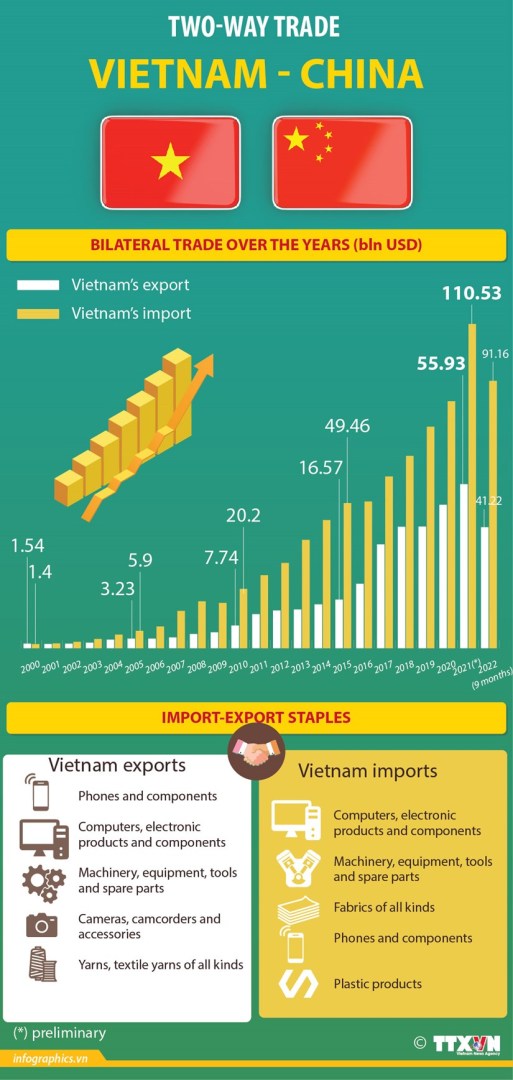
The two sides will continue to uphold the role of the Vietnam-China Joint Committee on Agriculture and the Vietnam-China Joint Committee for Fishery in the Gulf of Tonkin, intensify substantive cooperation in such fields as cultivation, farm produce processing, pest control, and release of young fish and protection of aquatic resources in the Gulf of Tonkin, and deepen investment cooperation in agriculture.
They will step up collaboration in sharing meteorological and hydrological data of the Hong (Red) River –Yuan River, Ky Cung River – Zuojiang, Mekong – Lancang River and other international rivers to help enhance capacity in preventing drought and flooding, while promoting cooperation in the use and protection of water resources in a balanced and appropriate manner in the framework of the Mekong-Lancang cooperation mechanism, and working together to enhance the level of safe, effective and sustainable use of water resources.
The two sides are willing to make the best use of the Vietnam-China Land Border Joint Committee, and the Vietnam-China Cooperation Committee for Management of Land Border Gates; continue to well implement legal documents on the Vietnam-China land border; and intensify security and order control in border areas, ensuring both disease prevention and control and facilitation of customs clearance at the border. The two sides agreed to push ahead with the implementation of the agreement on cooperation in protection and exploitation of tourism resources of Ban Gioc Waterfall (Vietnam) – Detian Waterfall (China), strive to put it into early pilot operation, thus building a model for cross-border and green tourism.
Paying attention to cooperation in culture, education, security
The two sides agreed to actively seek exchanges and cooperation in such fields as green development, climate change response, digital economy, etc, thus creating more growth points for Vietnam-China cooperation. The two sides concurred to continue making good use of the role of the Vietnam-China Joint Committee on Science and Technology Cooperation; actively promote scientific-technological cooperation, joint research and technological demonstration; and encourage the exchange of delegations at all levels to deepen cooperative ties in the above-mentioned fields.
The two sides agreed to continue following and implementing common perceptions of high-ranking leaders and the Global Development Initiative, actively research more cooperative projects to stimulate the economy and benefit people’s life. They will increase people-to-people friendship exchange, and education on Vietnam – China friendship, thus raising mutual understanding between the two peoples, especially young generations.
They consented to well carry out the Vietnam-China education cooperation agreement and encourage the sending of students to study in each other’s country. The Chinese side announced the provision of no less than 1,000 government scholarships and at least 1,000 others for Chinese language teachers, and personnel training for Vietnam.
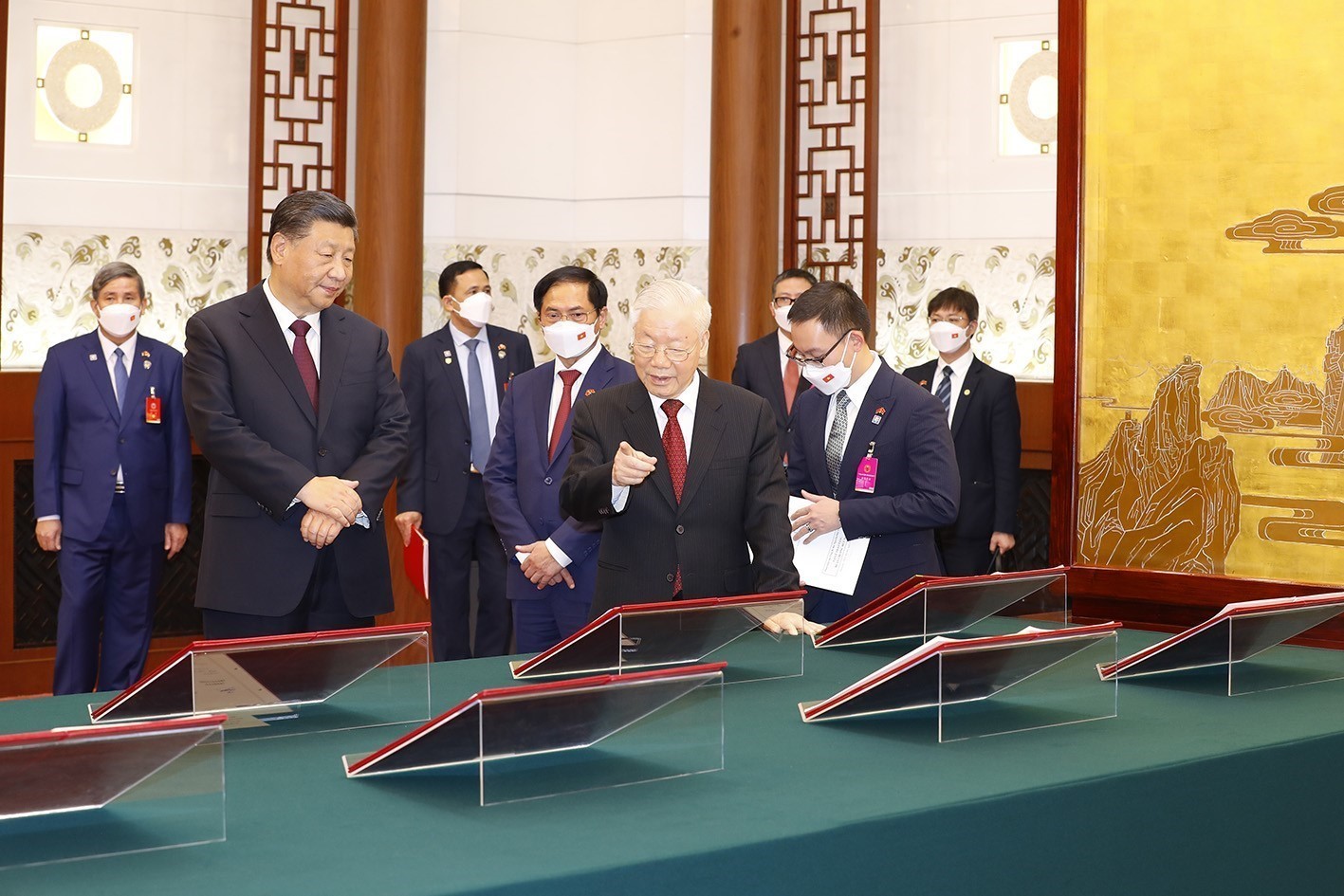
The two sides conducted sincere and frank in-depth exchanges on issues at sea; held that satisfactorily controlling differences and maintaining peace and stability in the East Sea is extremely important; and agreed to properly handle issues at sea, contributing to long-term peace and security in the region. They agreed to continue to adhere to important common perceptions reached between leaders of the two Parties and countries, and the agreement on basic principles guiding the settlement of sea-related issues between Vietnam and China; effectively use the government-level negotiation mechanism on the two countries’ border; through consultations and negotiations discuss temporary, transitional solutions that do not affect stances and policies of each side; and seek basic long-term solutions acceptable to both sides.
The two sides agreed to promote discussions on cooperation for development at sea and the delimitation of the sea area beyond the mouth of the Gulf of Tonkin, and speed up the two above-said matters to soon reach substantive progress. They are willing to continue carrying out cooperation in less sensitive fields at sea; discuss the expansion of cooperation at sea in the Gulf on the basis of meeting practical benefit of both sides.

They will continue to promote the full and effective implementation of the Declaration on the Conduct of Parties in the East Sea (DOC), and on the basis of consultation and consensus to soon reach a substantive and effective Code of Conduct in the East Sea (COC) in accordance with international law, including the 1982 United Nations Convention on the Law of the Sea (UNCLOS); well control differences at sea, without actions that complicate the situation and expand disputes; and maintain peace, stability in the East Sea and promote cooperation at sea.
The Vietnamese side reaffirmed its adherence to the “One China” policy, saying it supports the peaceful development of cross-strait relations and China’s great cause of reunification, and resolutely opposes any division act for “independent Taiwan” in all forms and consistently advocates the principle of non-interference in internal affairs of countries. Vietnam does not develop any state-level relations with Taiwan. The Chinese side highly valued Vietnam’s stance.
Making efforts for peace, cooperation and development in the world
The two sides held that the regional and global situation is evolving rapidly, complicatedly and unpredictably, tensions in hot spots are escalating; traditional and non-traditional security challenges intertwined; and multilateralism, economic globalisation, global peace and development facing a range of great difficulties and challenges. The international community needs to make joint efforts for peace, cooperation and development, creating more stability and positive energy to the world.

The two sides stressed that development is a guarantee of security, the key to addressing tough problems and bringing happiness to the people. The Vietnamese side said it supports and stands ready to participate in the Global Development Initiative with appropriate content and manner, and make joint efforts with other parties to contribute to the implementation of the United Nations 2030 Agenda for Sustainable Development. The two sides agreed to reinforce cooperation in international and regional frameworks like the World Trade Organisation (WTO), the Asia-Pacific Economic Cooperation (APEC), China-ASEAN and Mekong-Lancang; well implement the Regional Comprehensive Economic Partnership (RCEP) agreement; and boost regional economic links and encourage countries to develop together. The Vietnamese side backs China’s bid to join the Comprehensive and Progressive Agreement for Trans-Pacific Partnership (CPTPP) and its contributions to promoting economic and trade cooperation in Asia-Pacific.

Both emphasised that security is a premise for development. Vietnam recognised China’s Global Security Initiative on the basis of the goals and principles of the UN Charter. Vietnam said it is willing to work with China and concerned partners to maintain long-term peace and security in the world. The two sides agreed to step up cooperation within the framework of the UN, maintain exchanges and closely coordinate in international and regional issues of shared concern. The two sides will persistently implement and uphold multilateralism, jointly protect international justice, and observe the UN Charter and international law. They advocated that countries hold exchange and cooperate in the human rights issue on the basis of equality and mutual respect, and promote dialogue and international cooperation in the issue without politicising it./.


